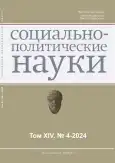Sanctions policy in the world: evolution of political discourse
- Authors: Soldatov R.G.1,2
-
Affiliations:
- St. Petersburg State University (SPbSU)
- Financial University under the Government of the Russian Federation
- Issue: Vol 14, No 4 (2024)
- Pages: 124-130
- Section: Political identity of Russia in the modern world
- URL: https://bakhtiniada.ru/2223-0092/article/view/279812
- DOI: https://doi.org/10.33693/2223-0092-2024-14-4-124-130
- EDN: https://elibrary.ru/PPJMMS
- ID: 279812
Cite item
Abstract
The author of the article aims to highlight the specific features of the application of sanctions in the international community in the context of the evolution of political discourse on sanctions policy. In his work, the author relies on the concept of the “three great debates” of the researcher Peter Wallensteen, applying it to the analysis of changes in the political situation around the use of sanctions and the reasons that lead to them. As main examples, the author analyzes sanctions of the League of Nations and the UN, as well as individual states. The author considers the change in political reasons leading to sanctions, as well as their transformation into an effective political instrument that is actively used primarily by international organizations. The issues of the effectiveness and ineffectiveness of sanctions are analyzed. The conclusions that the author comes to indicate that the successful implementation of sanctions policy requires the support of a sufficiently wide number of states. Thus, in the matter of using sanctions against certain states, the role of international organizations is undeniable. The development and formation of world politics and its trends bring new reasons for the use of sanctions. One should also not fail to take into account the leading world powers that are quite actively using sanctions policy for their own purposes.
Keywords
Full Text
##article.viewOnOriginalSite##About the authors
Robert G. Soldatov
St. Petersburg State University (SPbSU); Financial University under the Government of the Russian Federation
Author for correspondence.
Email: soldatovrobert1@gmail.com
SPIN-code: 1797-1810
applicant of Cand. Sci. (Polit.); St. Petersburg State University (SPbSU); senior lecturer, Department of Legal Regulation of Economic Activity; Financial University under the Government of the Russian Federation
Russian Federation, Saint Petersburg; MoscowReferences
- Grigoryan G.R. The effectiveness of the application of economic sanctions against the Apartheid regime in South Africa. Scientific Notes of the Institute of Africa of the Russian Academy of Sciences. 2020. No. 1 (50). Pp. 48–58. (In Rus.)
- Timofeev I. Economic sanctions as a political concept. Bulletin of MGIMO University. 2018. No. 2 (59). Pp. 26–42. (In Rus.). doi: 10.24833/2071-8160-2018-2-59-26-42.
- Ehrlichman V. The history of sanctions. The Historian. 2022. No. 89. (In Rus.). URL: https://историк.RF/journal/post/6378 (data of accesses: 23.07.2024)
- Howard N.P. The social and political consequences of the allied food blockade of Germany, 1918–1919. German History. 1993. Vol. 1. Issue 2. Pp. 161–188.
- Mulder N. The history of economic sanctions as a tool of war. Yale University Press. 25.02.2022. URL: https://yalebooks.yale.edu/2022/02/24/the-history-of-economic-sanctions-as-a-tool-of-war/ (data of accesses: 23.07.2024).
- O’Connell M.E. Debating the Law of Sanctions // EJIL. 2002. Vol. 13 No. 1. Pр. 63–79.
- Strang B. Collective failure: The League of Nations and sanctions against Italy. Brandon University. 2024. No. 2 (1). URL: https://www.brandonu.ca/research-connection/files/Strang-Feb-2024-wl-1.pdf (data of accesses: 23.07.2024).
- Wallensteen P. A century of economic sanctions: A field revisited. Uppsala Peace Research Papers. 2000. No. 1. URL: http://uu.diva-portal.org/smash/get/diva2:76170/FULLTEXT01.pdf (data of accesses: 18.07.2024).
Supplementary files








